24 hours with Emmanuelle Wargon (H.92)

Joining the government in October, Emmanuelle Wargon was recently appointed by the French president to lead the Great Debate. Last February 20, we accompanied this HEC graduate at the heart of the national consultation process.
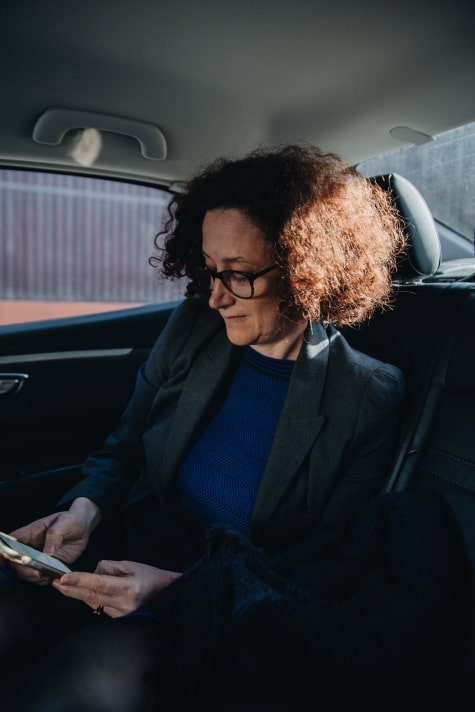
© Letizia Le Fur
Nothing’s moving in the courtyard of the Ministry for Ecological and Solidarity Transition on this grey morning in February. Everyone is waiting for the State Secretary. “Everyone” includes a bodyguard standing up straight with his hands clasped, the driver in the car outside the gate with the motor running (not very ecological), and Mailys, a young recruit with experience in community associations. Emmanuelle Wargon slips into the courtyard. The car starts, the right door shuts with a bang: Olivier, press advisor, has just gotten in without taking his eyes off his iPhone.
A minute later and we’re on the Boulevard St. Germain, heading toward the ring road, in the “following car”. Olivier reminds me why we’re making this trip: in France’s Great Debate initiative, Emmanuelle Wargon is in charge of relations with community associations and civil society. Yesterday, she met with Restos du Coeur; today, she will have a discussion with people working with Emmaüs in Montreuil.
Emmaüs Alternatives, Montreuil, 9:35 AM
Nicolas Bluche (H.73), president of Emmaüs Alternatives, is waiting at the front door. The minister doesn’t know it, but he’s another HEC graduate. If not for a 20-year gap, they could have been in the same class. The little ministerial group enters the reception area of the Emmaüs day center, where around 30 people, most of them not French, are finishing a motley breakfast (pieces of cheese, donuts, orange sections..). They didn’t wait for the State Secretary to get there before starting to eat and they don’t seem especially impressed by her arrival. She shakes each person’s hand. She says, “I’ve come here to listen to you, so that your ideas will count, even if you don’t go to city hall to participate in the debate.” She reminds them of the four themes of this national project: ecology, democracy, costs and taxes, and public services.
The first comment, by a corn farmer who came to France from Tunisia in 2012: “There’s no work. I’m in the shit because I can’t work.” “Do you have papers?”, the minister asks. “Not really…”, he says. Everyone laughs. Emmanuelle Wargon tries to get the discussion back on track. “Would you like to talk about how you can get your official papers to allow you to live and work here legally?” Responses come quickly. One person says, “Giving people papers would cut down on under-the-table jobs and people being exploited by their bosses. When they pay 30 euros for a day’s work, they’re just getting rich on the backs of others. They’re not bosses; they’re slave-drivers!” A Congolese woman explains that an administrative error has kept her waiting for her papers for two years. Emmanuel Wargon, elbows on the table, listens attentively and says that she doesn’t have the power to go against legal decisions, but that her ministry can work to solve administrative problems by “rowing in the same direction”. Not a very optimistic metaphor.
?
A tall Serbian causes a stir when he shows the minister a little metal object. He says, “In the summer, I can support myself very well with this thing.” He puts the object in his mouth, and an incredible sound of birds chirping echoes all over the room. A bird call. Everyone is surprised and starts laughing. Emmanuel Wargon gets back to the point gently. “And you, for example, you don’t want to return to Serbia?” “No, over there, salaries are around 200 euros a month, and you can’t support a family on that,” he says. Other personal stories follow, and we hear about the day-to-day miseries that so many endure. “I can’t buy diapers for my son anymore,” “I worked 12 hours a day and my boss won’t pay me what I’m owed,” “The 115 emergency number takes forever to answer and the people there are vulgar and mean”,“I hurt my back on the job and I can’t pay for medical treatment,” and more.
As the discussion continues, we learn that when government services go online, the most vulnerable members of society are even more disadvantaged: “The Internet is complicated and always overloaded. We have to resort to taxiphone stores that make appointments for us at government offices for 90 euros each time.” Other comments are more general. One person praises opening up social services to private investment: “The private sector will bring in its financial clout. That will destroy any unhealthy connections between social-services associations and political institutions. The current system is finished!” Another person suggests the opposite, that the government should invest even more: “Madame Minister, associations should get more financial support. We need more organizations like Emmaüs everywhere in the world!” We eventually discover that an assistant to the mayor of Montreuil is present. He suggests the creation of “public-service hackers, whose role would be to get past bureaucratic barriers.” Emmanuel Wargon takes note and asks him to send her a proposal with details.
It’s time to wrap things up, but for many of the participants, this is the moment to present their files, applications for political asylum, in the hope of getting a bit of help. One of them, wearing a Ferrari t-shirt and with a mischievous grin, asks if he can take a selfie with the minister. “Watch out for that one; he’s a flirt,” everyone tells her.
Emmaüs Reintegration Site Montreuil. 10:30 AM
Next stop: a visit to a workplace. An enormous hangar displaying a big poster showing Abbé Pierre as a young man, against a canary-yellow background. Inside, dozens of employees who are reentering the workforce are sorting, cleaning, touching up and repairing things that will eventually be sold in the adjoining store. These are the people the minister has come here to meet. The atmosphere is very different from that of the Emmaüs day center. These salaried workers are getting together in a big, modern, light-filled conference room. The audience is mostly young and they speak French well
Emmanuelle Wargon begins the discussion with an ambitious goal. “I want us to come up with two or three ideas that I can present to the president of France,” she explains. The first person to comment, however, wants to talk about her own situation. She’s a young woman who’s completing her civic service at Emmaüs. She complains, “Our salary is too low and we don’t get the activity bonus to supplement it.” The minister, trying to get the discussion back on track, says, “Apart from your personal issues, what ideas do you have as citizens of France for making things better?”
When no one says anything, the minister tries to elicit some responses. “For example, what about taxes, or blank votes?” she asks. “We’re for counting blank votes,” someone says. General support for this. Emmanuelle Wargon, in her role as midwife for the birth of the Great Debate, tries to get everyone to go a little farther. “But what exactly to you want to do with blank votes, apart from counting them? Should we cancel elections after a certain number of those votes are cast? If not, that will only make elected officials seem even less legitimate.” No one has an answer to this.
?
-
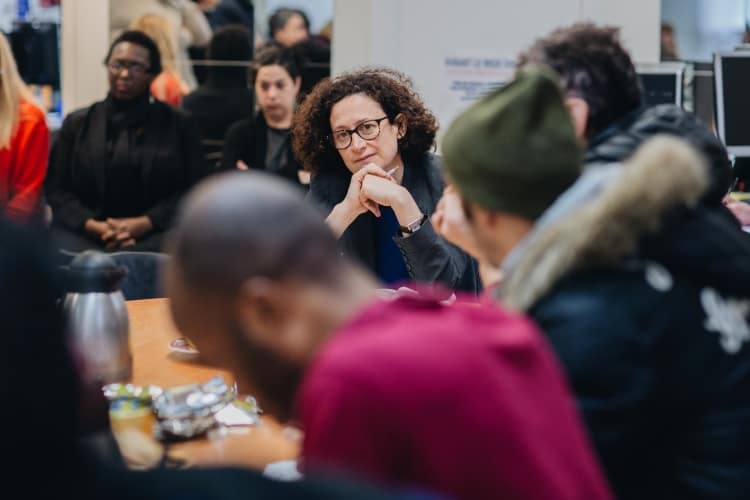
A mix of grievances and suggestions. Direct democracy is complex. -
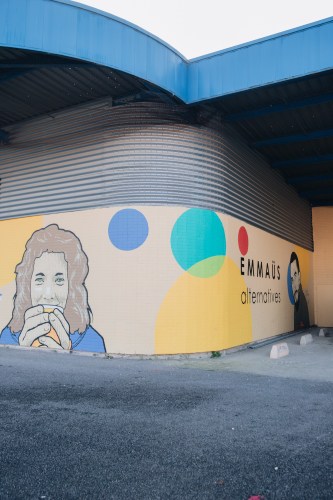
© Letizia Le Fur -
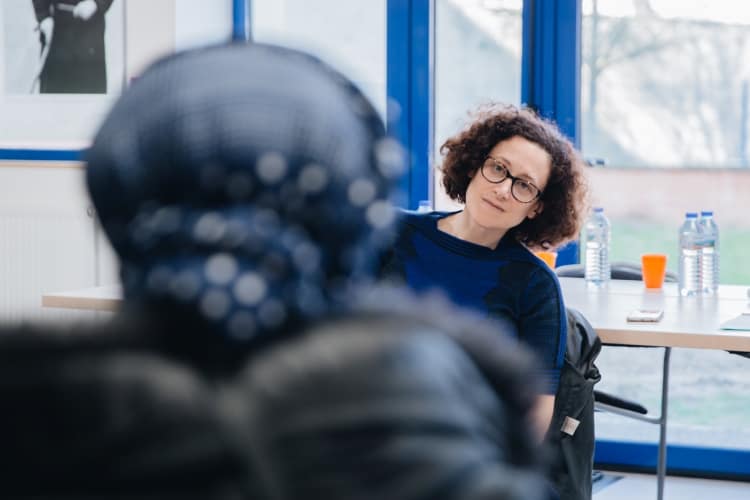
When people share their problems, sometimes difficult ones, with her, she willingly offers help without making empty promises.
Eventually, Catherine Di Maria, the general manager of Emmaüs Alternatives, offers the first concrete suggestion of the meeting. She gives the minister a dossier outlining the creation of a fund to support professional reintegration. She explains, “Sixty million euros to finance recycling centers and other venues in the circular economy, where we can foster a new lifestyle that’s both ecological and convivial.” Proposal recognized; dossier accepted. But Emmanuelle Wargon has come here to talk with the workers.
Several times, she tries to get them to comment on environmental issues. Without success. They want to discuss individual problems they have with the Family Allowance Fund, the reduction in housing assistance (“We need to ask ourselves some questions about that,” she concedes), low salaries…. One participant suggests raising the fines on companies that don’t hire enough handicapped workers: “We should take away half their revenues!” “That might be too much…,” the minister says.
It’s not easy, this direct democratic process, especially when one doesn’t want to make empty promises. On the other hand, it’s clear that everyone recognizes the minister’s sincere effort to listen to them, and they applaud her when she leaves the room.
The Ministry, Paris, 12:10 PM
Back to the ministry. It has been housed in the aristocratic Roquelaure mansion since 2007. This former residence of the Archchancellor Cambacérès has seen all the nobility of Europe pass through its opulent salons adorned with 18th century gilding. Quite a contrast to the rooms allocated to Emmanuelle Wargon, which are reached via a linoleum-covered stairway that echoes like a hospital ward. Her office is spacious and sunny, with modern, bright-red furniture and no gold leaf in sight.
As befits the office of an ecology minister, it is filled with plants. (The flourishing philodendron at the entrance is highly symbolic, since it’s known for its capacity to filter out pollutants.) On a big glass-covered table, there’s a plate of fruit under cellophane and a stack of newspapers with the satirical Le Canard Enchainé on top. “That pile is the semi-read,” she says with a smile. “I love reading newspapers instead of just counting on press releases. It’s important to me to stay informed about things beyond what directly concerns the ministry.” Let’s talk.
Office of the State Secretary, 12:30 PM
What does she think of the meetings this morning? She says, “It’s hard for me to respond to such delicate personal situations. How can a single woman with kids owe 12,000 euros to the Family Allowance Fund, for example? It’s insane. It shows that the administration has been making mistakes for years! A few weeks ago, when someone in Paris’s 15th district asked me about the threshold of the wealth tax on property (1.3 million in assets; it adds up quickly!), I had an answer to give. But for that single mother…. We are going to do what we can to unblock some of these situations.”
How can the comments of the people in this morning’s meetings contribute to the Great Debate? “First of all, it’s important to demonstrate that we want to hear the opinions of people who do not usually speak out in the public sphere. Meeting directly with these people is always beneficial since it helps us to understand what’s really happening. And, a few useful ideas did come out of the meetings, for example about blank votes, the activity bonus and tax evasion. On this last point in particular, I learned something that I’ll include in a synthesis: We think we are doing a lot to control tax evasion, but we need to work harder to make clear that we have zero tolerance for this.”
?
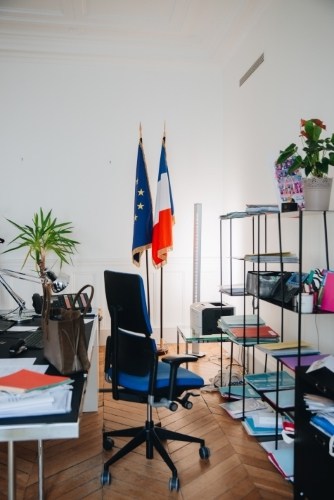
© Letizia Le Fur
And ecology? Has anyone been ready to discuss this, such as during the debate streamed on Twitch the previous day? “Many of the young people I spoke with during that debate were in a mood to protest, making accusations like ‘You aren’t doing enough for the environment’, or ‘You’re being paid off by lobbies’. I am ready to hear that we aren’t getting things done quickly enough, but first we need to agree on an assessment of what we really are and aren’t doing. In addition, we all need to take action at the individual level, as workers and consumers, and also at the level of local communities: encouraging car-sharing, participating in groups that share gardens, asking local city halls to welcome AMAPs (projects that bring farmers and consumers together), and so forth. People say that this is just a way of avoiding responsibilities and that the government should manage these things. It’s true that the government must do its job. But I think that the individual and community levels are also very important.”
I ask her about HEC and how France’s top business school can contribute to ecological transition. “The mission of business schools should be to help achieve a utopia: to drive the evolution of capitalism. It’s an enormous task, but that’s what we really need HEC to do. Whatever the heads of banks and investment funds are saying, the fact is that most investments being made today focus on short-term goals.
Unless we change the way we allocate resources, companies will only take into account risks that will have a direct and immediate impact on their business. Public-spiritedness, in the larger sense of the term, isn’t yet guiding the decisions that heads of corporations are making. When I worked for Danone, I collaborated with the Society and Organizations (S&O) center headed by Rodolphe Durand (H.93) and Bénédicte Faivre-Tavignot (H.88). Thanks to its research and educational activities, HEC can help take the economy to the next level of capitalism. In fact, this is the school’s stated goal, so “allez-y”; just do it!
The Ministry, 14:30 PM
One thing is sure: Emmanuelle Wargon wasn’t motivated by a desire to communicate when she agreed to a filmed meeting with the young people responsible for the Student Manifesto for an Ecological Awakening (see page 43). In fact, the cameras seemed to get on her nerves. It’s true that the video team invaded her office with lights and microphones, and they weren’t subtle about it. The three students take their places. She says, “I’m happy to have this first discussion with you today, but we can also meet again, with or without HEC Alumni and its projectors.” Ouch! Marion (H.22), Corentin (X) and Matthieu (H.19) were part of the group who put the manifesto together, and they explain their goals. As usual, Emmanuelle Wargon, taking notes, listens attentively and asks the students questions with sincere goodwill.
She says, “That’s great, what you’re doing. Now tell me how the ministry can help you.” Their answer is unexpected. They tell her, “I don’t think you can help us. In fact, we came here to discuss the opposite. We want to know how we can help the ministry. We want to understand the obstacles the government faces in developing major initiatives. Are lobbies blocking your efforts, as Nicolas Hulot has said?”
?
The State Secretary takes a long look at her notebook while considering how to respond: “I think that the stumbling blocks are more because of a mindset that hasn’t yet evolved. Clearly not all public policy has been developed with ecological concerns as the guiding principle. In addition, ecological transition is costly and taxes are already high, so we don’t have a lot of room to maneuver. Finally, ecological transition will be uncomfortable. We will have to accept changes in our consumption patterns, and we will also have to put more pressure on industry players. If we don’t do this, they will all say ‘Yes, but…’. ‘Yes, but if you impose this only on France, you will be penalizing French companies’, or ‘Yes, but if you create that tax, that will be an unfair burden on us,’ etc. If we’re truly ambitious, we will have to make decisions that will be hard to convince others to accept. You’ve already seen what happened when we imposed a carbon tax and reduced the speed limit to 80 kph.”
The students once again surprise the minister when they report that ecological issues are unfortunately rarely mentioned in management classes at HEC or at other top business schools. Even though these students are not asking her for her help, she gives them some advice: “It would be a good idea for you to identify some schools or companies that are leaders in this field. Don’t just encourage students to boycott companies that don’t take social concerns into account, but also steer them toward companies that are doing something positive.” Little by little, the meeting becomes a brainstorming session, with the State Secretary and the students on an equal footing. She asks, “What if you came up with a small document listing these 10 questions that you would ask a potential employer before agreeing to work for a company? Concerning education, since thousands of students signed your manifesto, it would be fantastic if you could organize initiatives throughout France to make more people aware of these issues.” “What we especially want,” explains Corentin, “is to see a common core of ‘ecology’ in higher education that would teach students how to get the message across. To spread a disease, we need a lot of people who are infected.” That makes her laugh. “Let’s find a different metaphor,” she advises.
Senate, press service, 1:43 PM
We were warned: At 4 PM, Emmanuelle Wargon is scheduled to participate in a debate in the Senate on hydrogen, but the exact time will depend on what happens before she is supposed to speak. When I get there, the senators are in the middle of a discussion about how to reduce the isolation of French territories. My press-service host confirms: there’s time. Since the mood is calm (“It wasn’t at all like this during the Benalla affair!”), he leads me through Luxembourg Palace to the journalists’ café, which serves the cheapest espresso in Paris (40 centimes). Along the way, he greets a member of the cleaning staff: “Here’s the bucket guard!” I watch TV screens for the end of territorial isolation and the beginning of hydrogen. An hour goes by without Emmanuelle Wargon.
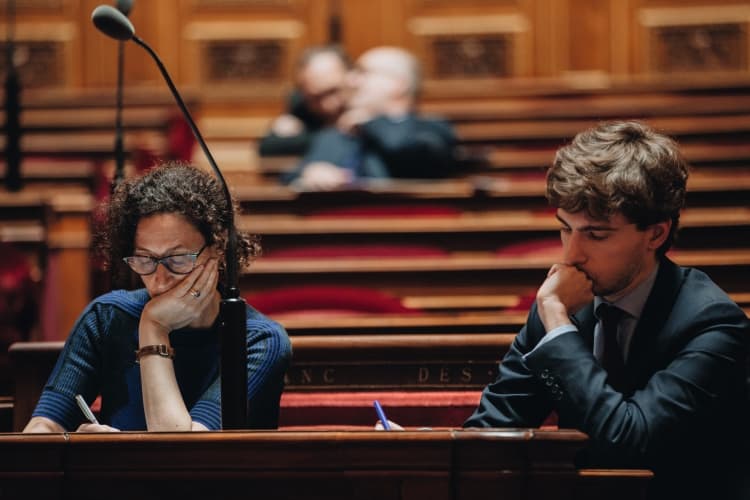
© Letizia Le Fur
The Senate Hemicycle, 4:30 PM
The territorial-isolation law is approved! Emmanuelle Wargon takes her place on the ministers’ bench and the hydrogen debate begins. It’s supposed to last one hour, with times strictly controlled: 10 minutes for the political group that launched the matter being discussed, 40 minutes divided among other groups, and 10 minutes for the minister.
Once again, her role is mainly to listen. Listen, in fact, to a debate that’s not very exciting, since the speakers facing the 20 senators in the room are all fundamentally in agreement with the main point: hydrogen is one of the keys to a transition toward clean energy. The only issue that sparks some argument is how much public funding should be earmarked for hydrogen development; for some, the planned budget falls short. They question the minister, whose face appears briefly on the room’s TV screens as she scribbles notes in her notebook. (How many of those notebooks does she fill up in a week?!)
They remind her of how successful hydrogen pilot projects have been, they invoke the genius of Jules Verne (who had predicted the use of hydrogen as an energy source), they urge the government not to hold French energy back…. Then it’s the State Secretary’s turn to speak. She reads her notes, without trying to make a big impression. The nearly-empty Hemicycle doesn’t call for that anyway. Following standard practice, she begins by summarizing what the speakers have said, and then she reminds everyone that an ambitious, 100-million-euro plan for hydrogen-technology development has already been agreed on. After a technical description of the advantages of this gas, she concludes: “We will meet this challenge together!” The meeting is over; the sun has set. That’s the end of this day spent with Emmanuelle Wargon, who once again leaves on Boulevard St. Germain.
Published by Arthur Haimovici

